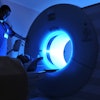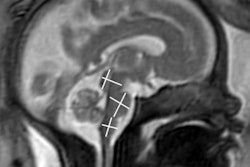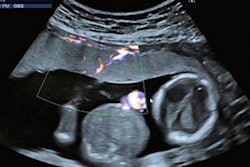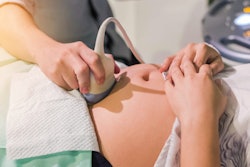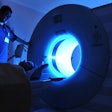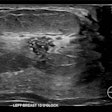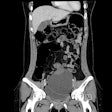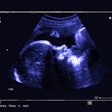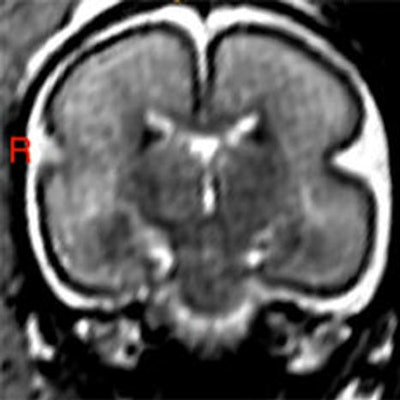
MRI reveals how women's prenatal drinking -- even in low or moderate amounts -- has a negative effect on fetal brain development, according to Austrian research to be presented at RSNA 2022 in Chicago.
The findings underscore the need to support pregnant women to abstain from alcohol use, wrote a team led by Dr. Patric Kienast of the Medical University of Vienna in Austria.
"Identification of the ... toxic effects [of alcohol on prenatal] brain development opens new diagnostic opportunities for fetal neuroradiology, allowing early postnatal support programs in these cases and stimulating the discussion of alcohol prevention during pregnancy to promote public health," the group noted.
Alcohol use during pregnancy exposes fetuses to fetal alcohol spectrum disorders, which can cause learning disabilities, behavioral problems, or speech and language delays, according to the investigators.
 (Left) Fetal brain post-intrauterine alcohol exposure in a fetus between 25 and 29 gestational weeks. Note the smooth cortex in the frontoparietal and temporal lobes. (Right) Brain of matched healthy control case in a fetus between 25 and 28 gestational weeks. The superior temporal sulcus is already bilaterally formed (red arrows) and appears deeper on the right hemisphere than on the left. Image and caption courtesy of the RSNA.
(Left) Fetal brain post-intrauterine alcohol exposure in a fetus between 25 and 29 gestational weeks. Note the smooth cortex in the frontoparietal and temporal lobes. (Right) Brain of matched healthy control case in a fetus between 25 and 28 gestational weeks. The superior temporal sulcus is already bilaterally formed (red arrows) and appears deeper on the right hemisphere than on the left. Image and caption courtesy of the RSNA."Unfortunately, many pregnant women are unaware of the influence of alcohol on the fetus during pregnancy," Kienast said in a 22 November RSNA statement. "Therefore, it is our responsibility ... to actively educate the public about the effects of alcohol on the fetus."
The researchers conducted a study that included MRI exams of 24 fetuses between 22 and 36 gestational weeks who were exposed to alcohol, matching each with 20 control cases of fetuses who had not been exposed to alcohol. The investigators assessed fetal brain maturation using the fetal total maturation score (fTMS), which consists of the sum of six subscores (lower scores indicate poorer health) of the following:
- Degree of frontal and occipital sulcation
- Degree of insular sulcation
- Extent of visualization of the germinal matrix
- Extent of myelination
- Presence and depth of both the superior and inferior temporal sulcus (an area of the brain associated with social cognition, audiovisual integration, and language perception)
- Audiovisual integration
- Language perception
Of the 24 women, 17 reported having fewer than one drink per week, three reported having three drinks per week, two reported having four to six drinks per week, one reported an average of 14 or more drinks per week, and six reported at least one binge drinking event (four or more drinks on one occasion).
Compared to controls, the fTMS scores were significantly lower in fetuses exposed to alcohol (p = 0.007), and the right superior temporal sulcus of these fetuses was shallower (p < 0.001). This was true even for fetuses with mild alcohol exposure.
"As we show in our study, even low levels of alcohol consumption can lead to structural changes in brain development and delayed brain maturation," Kienast said.
The RSNA meeting begins in Chicago on 27 November. To read preview articles about the congress, go to the RSNA 2022 news section of AuntMinnie.com.



